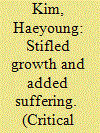|
|
|
Sort Order |
|
|
|
Items / Page
|
|
|
|
|
|
|
| Srl | Item |
| 1 |
ID:
127765


|
|
|
|
|
| Publication |
2014.
|
| Summary/Abstract |
This article describes and analyzes two approaches in South Korean civil society to the issue of human rights in North Korea: a civil and political rights-based approach and an economic, social, and cultural rights-based approach that emphasizes the right to food. By analyzing the relationship between the policy stances of South Korean administrations in respect of North Korean human rights (NKHR) and NGO (nongovernmental organization) advocacy, this essay argues that South Korean humanitarian and human rights NGOs contributed to the adoption of different human rights norms in South Korean society. Since 2000, South Korean humanitarian NGOs separated civil and political rights (CPR) concerns from economic, social, and cultural rights (ESCR) concerns and selectively adopted the latter by limiting these human rights to the "right to food." Under the hard-line policy of the Lee Myung-Bak administration (2008-2012), South Korean human rights NGOs resumed active advocacy targeting the international community by exposing poor CPR situation in North Korea through transnational human rights networks given the CPR approach and this led to the dominance of the CPR approach in South Korean civil society. Thus, humanitarian and human rights NGOs in South Korea narrowed the focus of human rights norms to CPR and this emphasis influenced and shaped the way later political administrations in South Korea viewed human rights issues related to North Korea.
|
|
|
|
|
|
|
|
|
|
|
|
|
|
|
|
| 2 |
ID:
127767


|
|
|
|
|
| Publication |
2014.
|
| Summary/Abstract |
The United States rhetorically promotes a nuclear-free North Korea with an open economic system, eager for the country to become an integrated member of the global community. Sanctions Washington has imposed on Pyongyang since the outbreak of the Korean War, however, have failed to advance this objective. Indeed, sanctions have proven to be counterproductive. While having a negligible effect on North Korea's nuclear and missile programs, sanctions also restrict the inflow of foreign investment, thereby stymieing North Korea's efforts to recalibrate its economic system. The dearth of foreign investment further limits the establishment of market-based exchanges that would facilitate economic liberalization, a process that could improve economic security in North Korea. It is the North Korean people, moreover, not the governing elite, who bear the ultimate costs and suffer under these sanctions, creating undeniable tension when considering the causal relationship between economic sanctions and human rights. Despite assurances offered by U.S. administrations that sanctions policies exclusively target the government, this article argues that economic restrictions play a significant role in the country's economic woes, inhibiting Pyongyang from improving the standard of living for the North Korean people and failing to promote an improvement in basic economic rights.
|
|
|
|
|
|
|
|
|
|
|
|
|
|
|
|
|
|
|
|
|